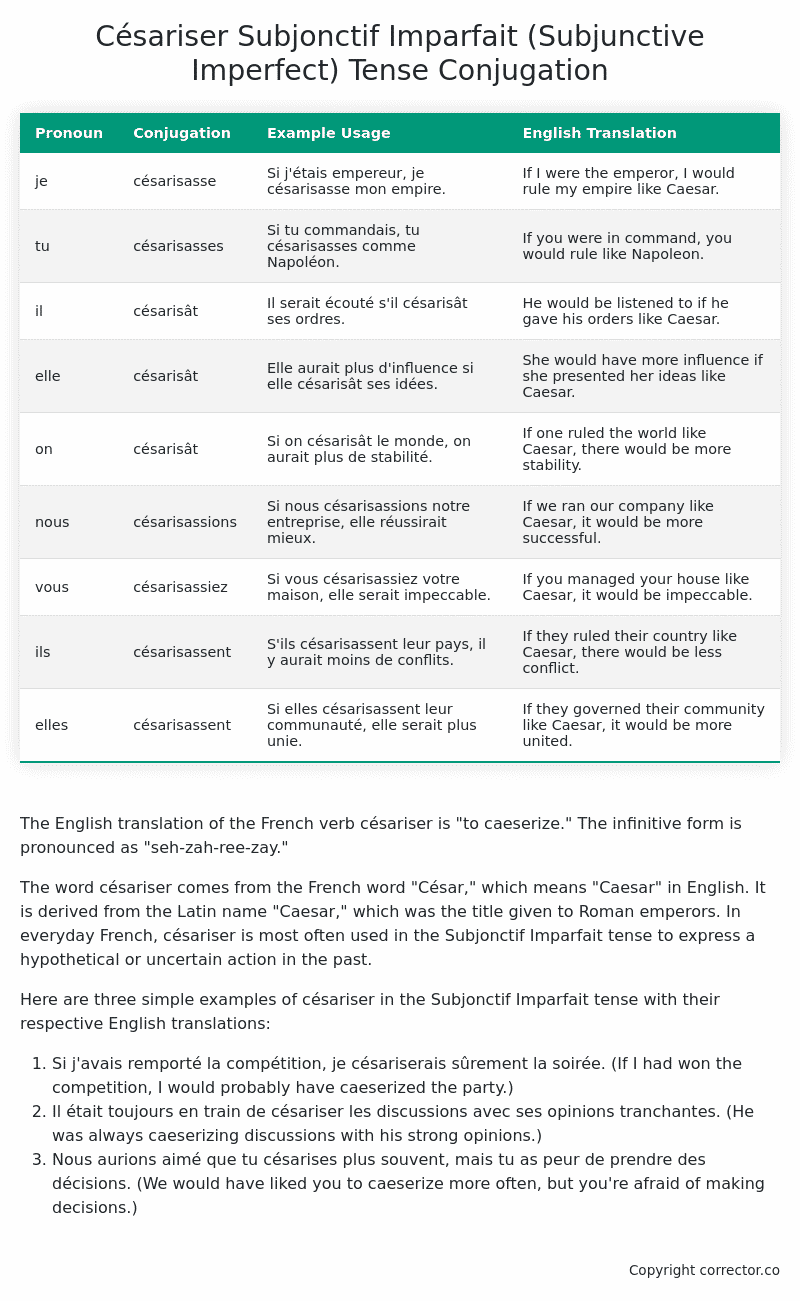Subjonctif Imparfait (Subjunctive Imperfect) Tense Conjugation of the French Verb césariser
Introduction to the verb césariser
The English translation of the French verb césariser is “to caeserize.” The infinitive form is pronounced as “seh-zah-ree-zay.”
The word césariser comes from the French word “César,” which means “Caesar” in English. It is derived from the Latin name “Caesar,” which was the title given to Roman emperors. In everyday French, césariser is most often used in the Subjonctif Imparfait tense to express a hypothetical or uncertain action in the past.
Here are three simple examples of césariser in the Subjonctif Imparfait tense with their respective English translations:
- Si j’avais remporté la compétition, je césariserais sûrement la soirée. (If I had won the competition, I would probably have caeserized the party.)
- Il était toujours en train de césariser les discussions avec ses opinions tranchantes. (He was always caeserizing discussions with his strong opinions.)
- Nous aurions aimé que tu césarises plus souvent, mais tu as peur de prendre des décisions. (We would have liked you to caeserize more often, but you’re afraid of making decisions.)
Table of the Subjonctif Imparfait (Subjunctive Imperfect) Tense Conjugation of césariser
| Pronoun | Conjugation | Example Usage | English Translation |
|---|---|---|---|
| je | césarisasse | Si j’étais empereur, je césarisasse mon empire. | If I were the emperor, I would rule my empire like Caesar. |
| tu | césarisasses | Si tu commandais, tu césarisasses comme Napoléon. | If you were in command, you would rule like Napoleon. |
| il | césarisât | Il serait écouté s’il césarisât ses ordres. | He would be listened to if he gave his orders like Caesar. |
| elle | césarisât | Elle aurait plus d’influence si elle césarisât ses idées. | She would have more influence if she presented her ideas like Caesar. |
| on | césarisât | Si on césarisât le monde, on aurait plus de stabilité. | If one ruled the world like Caesar, there would be more stability. |
| nous | césarisassions | Si nous césarisassions notre entreprise, elle réussirait mieux. | If we ran our company like Caesar, it would be more successful. |
| vous | césarisassiez | Si vous césarisassiez votre maison, elle serait impeccable. | If you managed your house like Caesar, it would be impeccable. |
| ils | césarisassent | S’ils césarisassent leur pays, il y aurait moins de conflits. | If they ruled their country like Caesar, there would be less conflict. |
| elles | césarisassent | Si elles césarisassent leur communauté, elle serait plus unie. | If they governed their community like Caesar, it would be more united. |
Other Conjugations for Césariser.
Le Present (Present Tense) Conjugation of the French Verb césariser
Imparfait (Imperfect) Tense Conjugation of the French Verb césariser
Passé Simple (Simple Past) Tense Conjugation of the French Verb césariser
Passé Composé (Present Perfect) Tense Conjugation of the French Verb césariser
Futur Simple (Simple Future) Tense Conjugation of the French Verb césariser
Futur Proche (Near Future) Tense Conjugation of the French Verb césariser
Plus-que-parfait (Pluperfect) Tense Conjugation of the French Verb césariser
Passé Antérieur (Past Anterior) Tense Conjugation of the French Verb césariser
Futur Antérieur (Future Anterior) Tense Conjugation of the French Verb césariser
Subjonctif Présent (Subjunctive Present) Tense Conjugation of the French Verb césariser
Subjonctif Passé (Subjunctive Past) Tense Conjugation of the French Verb césariser
Subjonctif Imparfait (Subjunctive Imperfect) Tense Conjugation of the French Verb césariser (this article)
Subjonctif Plus-que-parfait (Subjunctive Pluperfect) Tense Conjugation of the French Verb césariser
Conditionnel Présent (Conditional Present) Tense Conjugation of the French Verb césariser
Conditionnel Passé (Conditional Past) Tense Conjugation of the French Verb césariser
L’impératif Présent (Imperative Present) Tense Conjugation of the French Verb césariser
L’infinitif Présent (Infinitive Present) Tense Conjugation of the French Verb césariser
Struggling with French verbs or the language in general? Why not use our free French Grammar Checker – no registration required!
Get a FREE Download Study Sheet of this Conjugation 🔥
Simply right click the image below, click “save image” and get your free reference for the césariser Subjonctif Imparfait tense conjugation!

Césariser – About the French Subjonctif Imparfait (Subjunctive Imperfect) Tense
Formation
Common Everyday Usage Patterns
Interactions with Other Tenses
Subjonctif Présent
Indicatif Passé Composé
Conditional
Conditional Perfect
Summary
I hope you enjoyed this article on the verb césariser. Still in a learning mood? Check out another TOTALLY random French verb conjugation!


